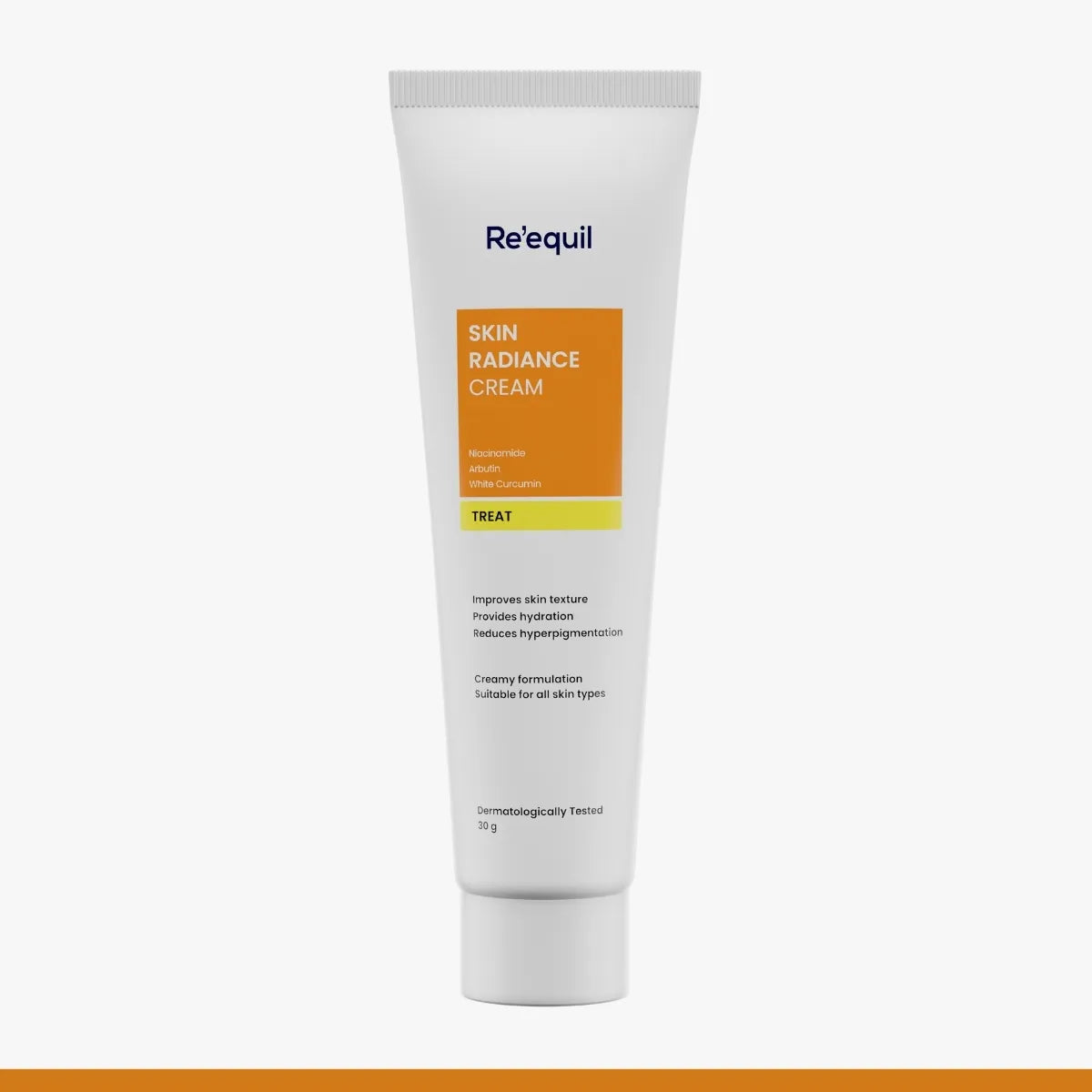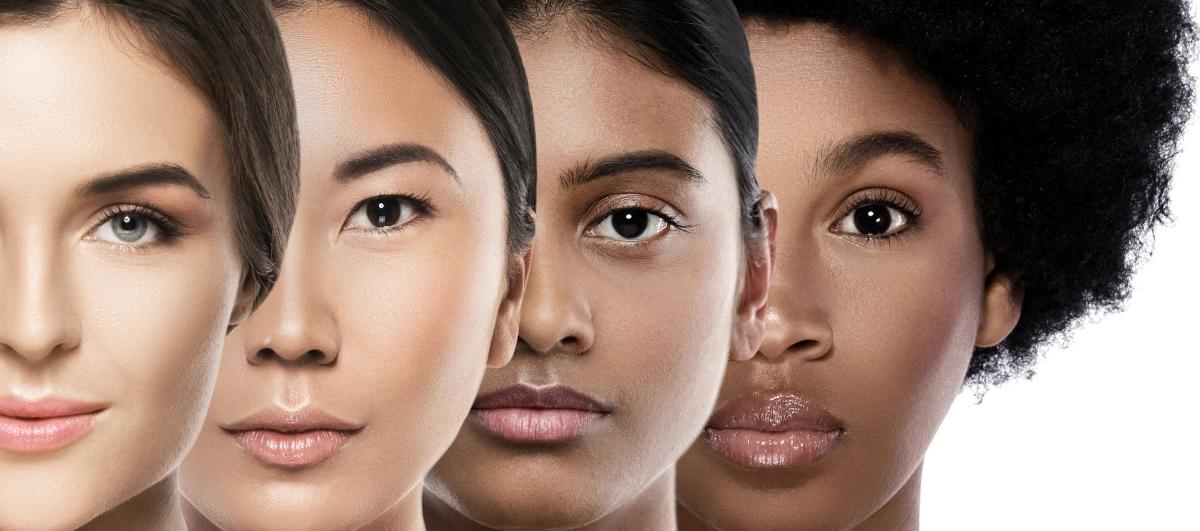We all come in different shapes and sizes; our skin is no exception. But have you ever stopped to understand the different types of skin complexions out there? There's a science behind melanin (skin pigment) and how it creates the beautiful diversity of colors in our world.
Well, we are here to deconstruct how this skin pigment works and explore the various types of skin complexions. We'll also discuss tips for having healthy skin for every shade and tone.
So let's get started on our exploration of the beautiful world of skin!
What is Melanin?
Melanin is a skin pigment produced in the cells called melanocytes. It is responsible for giving skin, hair, and eyes their color and helps protect the skin from the sun's UV rays. It is vital in protecting the skin from sun damage, which can cause premature aging, wrinkles, discoloration, and other long-term damage.
Different types of skin complexions
Type 1 - Very fair or ivory
Type 2 - Fair
Type 3 - Medium or normal
Type 4 - Olive
Type 5 - Brown skin
Type 6 - Black skin
Type 1 Very fair or ivory skin
Very fair or ivory skin types are non-pigmented with low melanin content. It exhibits an extremely light complexion, often with pink undertones. This skin type is usually considered the most lightweight and sensitive. It can be prone to sunburns and sun damage leading to premature aging.
Type 2 - Fair skin
Fair skin type is a skin type that can be easily prone to sunburns and tanning as opposed to other shades of skin. Fair skin type is characterized by a pale or fair complexion with yellow, peach, or olive undertones. People with fair skin usually have less melanin, which can also put them at risk for severe damage from the sun's UV radiation. Hence, their skin burns quickly and is prone to get freckles.
Type 3 - Medium or normal skin type
Medium/normal skin types generally have a light complexion, warm undertone and are less prone to sun damage. They might experience some pigmentation or discoloration. However, they usually maintain an even skin tone and a healthy glow.
Type 4 - Olive skin
Olive skin is a unique skin type with both neutral and warm undertones. It can range from light to moderate tan and often features a yellow, green, or golden hue. People with olive skin can tan easily due to sun exposure.
Type 5 - Brown skin
Brown skin is a type of melanin-rich skin belonging to the family of deeper skin tones. It has a distinct warmth and depth, with shades ranging from light brown to dark brown and sometimes even black. People with this type of skin rarely develop freckles. However, they are prone to sun damage without protection if exposed for too long.
Type 6 - Black skin
Melanin is the pigment in the skin that helps protect against UV rays. Black skin is filled with melanin-rich cells less prone to burning and likely to tan darkly. Due to their high levels of melanin, it is usually tricky for people with black skin to get rid of tans. Still, it also can make people with black skin more susceptible to inflammation and injury.
Essential skin care tips for a clear and glowing complexion
No matter your skin complexion, undertone, or skin type, if you don't follow specific crucial skincare tips, your skin will start showing early aging, spots, pigmentation, dull complexion, and much more. Hence, when it comes to skincare, knowing the right tips and tricks is essential in keeping your skin complexion radiant with age.
1. Moisturisation is the key to a healthy skin barrier
A moisturizer relieves dryness, maintains the skin's elasticity, and prevents premature aging. It helps restore its natural moisture balance, making it feel softer and smoother. A good moisturiser should contain ingredients with the three crucial properties of hydration - Emollients, Humectants, and Occlusives.
Emollients provide a protective coating on the skin and help retain moisture.
Humectants draw water from the environment into the skin and prevent dryness.
At the same time, Occlusives seal in moisture and make sure your skin stays hydrated.
Super skin-hydrating ingredients to look for in your moisturiser -
-
Hyaluronic acid
Hyaluronic acid has emollient properties that keep skin hydrated while also working to reduce wrinkles. Its unique ability to draw water from the dermis into the epidermis makes it a powerful humectant clinically proven to hydrate skin and boost its moisture retention capabilities. In addition, hyaluronic acid helps reduce the appearance of wrinkles by strengthening and hydrating the delicate dermal layers in your skin.
-
Ceramides
Ceramides are the essential ingredient in moisturisers because it helps to create a barrier on the skin to prevent moisture loss and environmental damage. It can help protect your skin from dryness and irritation by locking in essential moisture, resulting in a healthier, more radiant-looking complexion. Ceramides also provide anti-aging benefits and work to support beneficial cellular turnover rates, helping you maintain a youthful glow.
Note - Other ingredients to look for in a moisturizer include Betaine, Alpha Bisabolol, Jojoba Oil, and Madecassoside. Saccharide Isomerate is an effective humectant that helps skin retain its natural moisture levels. Cydonia oblonga leaf extract has anti-inflammatory properties and can be used as a soother to heal sensitive skin. Biosaccharide Gum 1 is a texture enhancer that gives moisturizers a lovely silky feel. It's perfect for those with dry or cracked skin.
2. Never skip your sunscreen
The sun emits invisible ultraviolet (UV) rays that can cause damage to your skin, even on cloudy or overcast days. Sunscreen is not just a seasonal must-have. It's an everyday essential! It protects you from the harmful UVA and UVB rays that can cause sunburns, wrinkles, and age spots and defends against skin cancer. Long-term sun exposure without proper protection has been linked to premature aging and a lot of other skin concerns like PIH, blemishes etc, so the daily application of sunscreen is crucial for your skin. Opt for a sunscreen that is non-comedogenic and has a broad spectrum SPF of atleat 50 and PA +++ or more.
3. Introduce Vitamin C in your skincare regimen
Vitamin - C is a powerful antioxidant with antimicrobial and anti-inflammatory properties. This L-ascorbic acid can help protect and replenish your skin. Research studies have proven that it helps boost collagen production, reduce the signs of aging, and protect against environmental damage from sun exposure and pollution. It is also effective in treating hyperpigmentation and healing acne.
Vitamin - C has different derivatives that work wonders on your skin. But, which kind of vitamin C is perfect for the skin?
-
Sodium Ascorbyl Phosphate
It is an oil-soluble vitamin - c derivative that helps fight free radicals and has antioxidant properties targeting oily and acne-prone skin. It soothes inflammation and irritation caused by acne, which reduces the visibility of acne scars by enhancing collagen production.
-
Ascorbyl Tetraisopalmitate
It is an oil-soluble vitamin C derivative helps to reduce the damage from free radicals, which can promote the signs of aging. Because Ascorbyl Tetraisopalmitate is oil-soluble, it can penetrate deeply into the dermis and offer lasting antioxidant benefits compared to traditional water-based serums.
Research reveals that Ethyl Ascorbic Acid is a form of vitamin C that stimulates collagen production for firmer and brighter-looking skin and helps minimize dark spots, wrinkles and skin discoloration.
Pro Tip - Taking vitamin C in the form of a serum helps deliver its benefits directly to your skin, so it can be absorbed quickly and more effectively than other forms such as topical creams or oral supplements.
4. Follow a night skincare routine
A well-curated night skincare routine is essential for healthy, active and glowing skin because, during the night, your skin repairs and rejuvenates itself from daytime damage. Your skin actively produces necessary compounds to repair while you're sleeping. The anti-aging ingredients in products are also best absorbed by your skin at night, which further helps it get the nutrients it needs to protect itself and fight premature aging.
Follow a CTM routine and try incorporating a retinol night cream. Retinol can help fight signs of ageing and can help even your skin tone. Don’t forget to apply sunscreen the next morning.
5. Eat a healthy and balanced diet
Eating balanced meals rich in omega-3 fatty acids, antioxidants, and vitamins is essential for overall good health, including skin.
- Omega 3 fatty acids help protect the skin from sun damage and other environmental factors that cause wrinkles and dryness.
- Antioxidants help clear toxins from your body while also helping prevent premature skin aging. Vitamins A, B, C, and E are essential for skin health. They provide nourishment that reduces wrinkles and keeps your complexion looking young and vibrant.
Additional tips for glowing skin
In addition to the tips mentioned above, here are some other tricks that can help you achieve perfect skin:
- Drink plenty of water to keep your skin hydrated and flush out toxins.
- Get enough sleep to help your skin rejuvenate and repair.
- Wash away all the gunk before you hit the bed as going to bed with makeup on is a big no-no for your skin! Not only does makeup clog up your pores, preventing them from breathing, but it can also make skin look dull and aged over time.
- Avoid washing your face with boiling and chilly water; instead, use lukewarm water.
- Use a gentle cleanser that is fragrance-free and won't irritate your skin.
- Avoid using products with harsh chemicals such as alcohol or synthetic fragrances.
- Avoid using exfoliants and masks that can irritate your skin. Don't over-exfoliate your face, as this may cause redness, breakout and much more. Stick to 2-3 times an exfoliation per week, depending on your skin type.
- Exercise regularly to promote blood circulation and oxygenation, which helps maintain blooming skin.
Quick Enlightenment: Choose skincare products according to your skin type! Different skin types require other ingredients to remain moisturized, hydrated, and free from breakouts. Ensure that you use non-comedogenic formulations which are effective.
Final Thoughts
A hydrated, active and fresh skin makes you feel confident and builds up healthy self-esteem. Managing your unique complexion is vital to unlocking a healthy skin, from acne-prone teenagers to aging adults. Following the tips above, you can develop a skincare routine tailored to your needs that helps you achieve glowing skin. Remember, consistency is key, so stick to your skincare routine and be patient.





